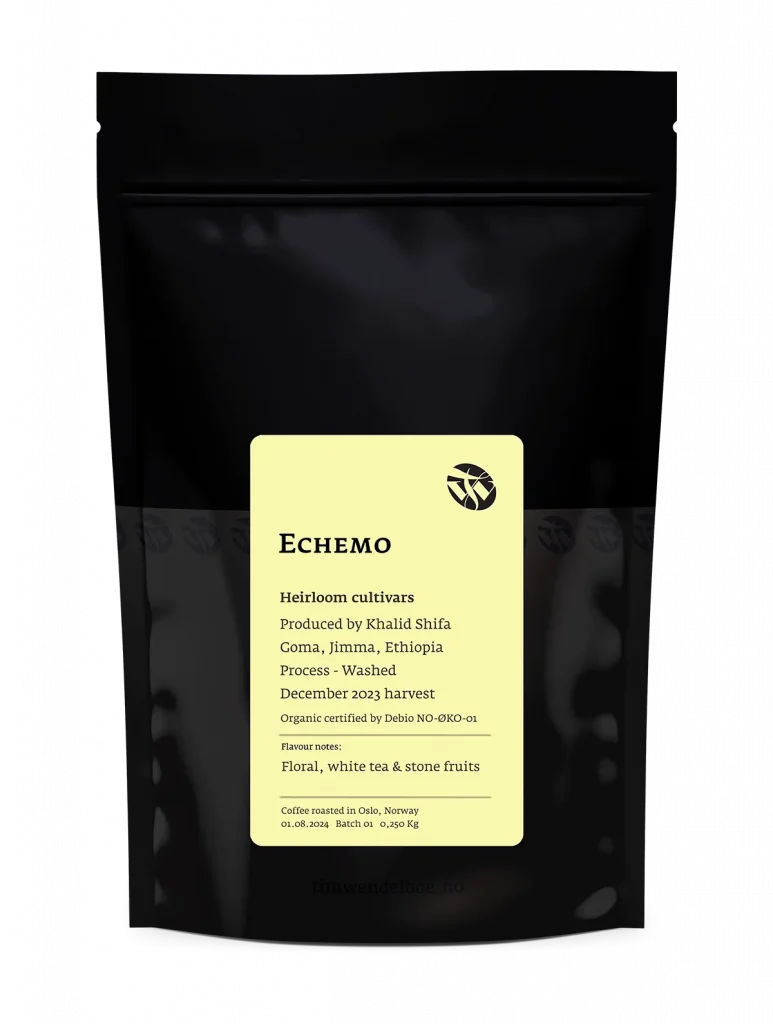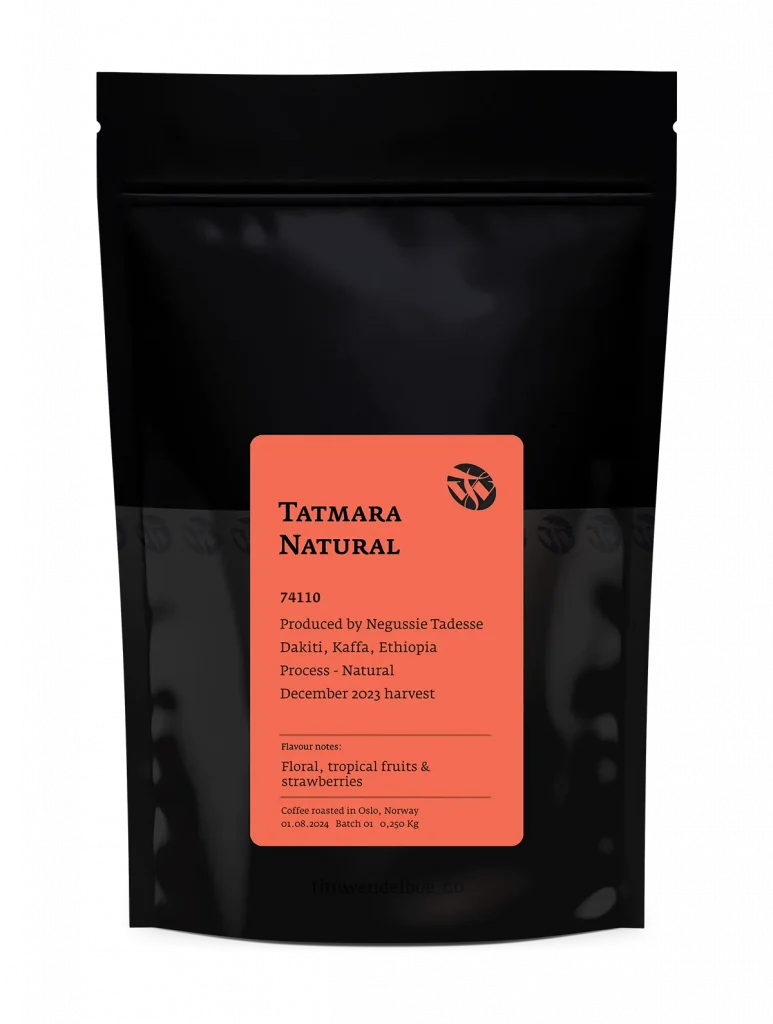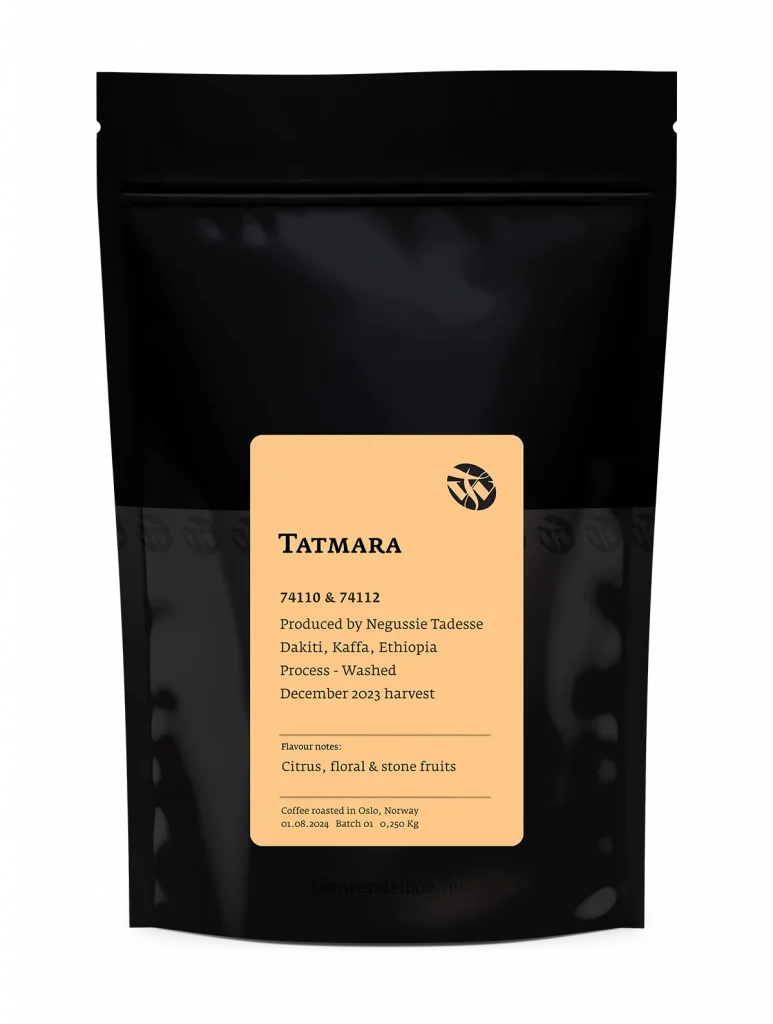Dear coffee subscriber,
The coffees from Ethiopia finally arrived at our warehouse last week after significant delays due to shipping problems. As soon as they arrived, we rushed to the warehouse to get a few boxes out so we could do some test roasts in time to send out our first production roasts to our subscribers. We had already made videos and planned for these coffees to go out in August, but we did not expect the shipping to be as slow as it ended up being. Nevertheless, they are here now, and you have something to really look forward to.
Last year, I went to Ethiopia to discuss and evaluate how the coffees we buy from Negussie Tadesse and Khalid Shifa could be improved. I found a lot of room for improvement, and together with both farmers and the team at Belco in Ethiopia, we developed new protocols to enhance processing, drying, storage techniques, milling, and logistics. Both Khalid and Negussie agreed to follow all the steps, and I must say it greatly improved the quality of their coffees. You can learn more about this in the texts below.
P.S. Like many Ethiopian and Geisha coffees, these coffees can produce a bit more fines (dust) during grinding, which might clog your paper filter when brewing filter style like V60, Kalita, or similar methods. Hence, you might experience much longer brew times. Our recommendation is not to grind coarser but rather to try to agitate the slurry less while brewing and let it take more time to finish. High extractions of these coffees only make them more aromatic and sweet, and we find them pretty easy to extract too.
Echemo (1st & 4th bag)

Flavour notes
Floral, white tea & stone fruits
Producer
Khalid Shifa
Harvest
December 2023
Origin
Goma, Jimma, Ethiopia
Process
Washed
Cultivar
Heirloom from Coche forest
Organic certified by Debio NO-ØKO-01
Last November, I was finally able to go and visit Khalid at the start of his harvest. The goal was to go through his production steps to see if we could agree upon a protocol for him to follow in order to try to elevate the quality of his coffees. As usual, there were many small details that could be improved, some with minor and others with major impacts on the final quality.
A few of the major changes included separating each daily picking and storing each daily lot in airtight GrainPro bags after drying. Drying the coffees under shade nets, keeping better control of the fermentation and slightly changing the process were also part of what we changed and improved. This meant that I was able to evaluate around 20 samples, each representing a daily picking, instead of just 2-3 samples like previous years where the coffees had been bulked together.
By doing this, we could separate the lower quality lots from the higher quality ones. Combined with better processing and drying practices, the coffees became cleaner and more expressive. We would of course not be able to change all this in such short time had it not been for the wonderful help and follow up done by Fantanesh Keleme and the whole team at Belco in Ethiopia, who made sure Khalid understood and followed the protocols for all the coffees he produced for us.
We also milled the coffees in a smaller dry-mill this year where we were able to vacuum pack the coffees from Ethiopia for the first time. This helps preserve the coffees flavour and freshness for a much longer time.
The washed coffees from Echemo are very delicate and soft. I find it is like drinking a white tea with some nice notes of peach and florals. It is very different to the typical Yirgacheffe or Guji coffees from the south of Ethiopia, most likely because it is grown in a different area and is from different cultivars.
Tatmara Natural (2nd & 5th bag)

Flavour notes
Floral, tropical fruits & strawberries
Producer
Negussie Tadesse
Harvest
December 2023
Origin
Dakiti, Kaffa, Ethiopia
Process
Natural
Cultivar
74110
Tatmara is one of the most beautiful coffee plantations I have ever been to. The coffee grows within a forest full of old native trees, spice plants, shrubs, and wildlife. Negussie does not apply any mineral fertilisers or agrochemicals to his farm, and weed control is done manually. Despite this, the trees remain healthy and productive, likely due to the rich, biologically active forest soils that provide the trees with nutrients. I personally believe that these coffees are so complex, full of flavour, and easy to extract not only because of the cultivar that are grown but also because they grow slowly under shade trees in very healthy soils within their native environment. (After all, Arabica coffee trees are native to the forests of Kaffa.)
Of course, the natural process also contributes to the added complexity and fruity flavours, but as you may know, I am normally not the biggest fan of naturally processed coffees. This is because they are really difficult to produce well, particularly in regions that experience rain showers during the harvest, such as Kaffa.
I often find that naturally processed coffees can have overpowering ‘funky’ flavours of fermented fruit due to uncontrolled fermentation during drying. However, I do like very clean and precise natural processed coffees. When done well with the right cultivars, they can taste very juicy and fruity in a refreshing way. The coffees from Tatmara are a good example of a natural processed coffee that I really like. Negussie has been trained by the Belco team in how to process and dry the coffees, resulting in a clean and delicious natural processed coffee with ripe flavours of tropical fruits and strawberries.
Like last year, the coffees from the 2023/24 harvest have a subtle ‘natural processed’ flavour profile. I believe this is due to the dry weather conditions during the harvest, which made drying more efficient, and also because Negussie has built more drying tables and increased drying capacity on the farm. This means he can dry the coffee cherries in very thin layers on the raised beds, allowing them to dry faster. More efficient drying prevents spontaneous fermentation inside each coffee cherry from influencing the flavour too much. This makes the coffee taste less fermented and maybe more similar to a honey processed coffee.
For this harvest, we also asked Negussie to separate each daily picking and store them separately in airtight GrainPro bags after drying. By doing this, we were able to taste through all the daily pickings and reject any lots with quality issues. Instead of bulk everything together, we decided to blend lots with similar qualities and the same cultivar.
Negussie has also invested in a dry mill to remove the husks from his naturals before they are transported to the dry-mill in Addis Ababa. This allows him better control and speeds up logistics, which helps preserve the quality of his naturally processed coffees. As with Khalid’s coffees, we were able to mill Negussie’s coffees on a better dry mill and vacuum pack them for the first time, resulting in coffees that taste better and fresher than ever before.
Tatmara (3rd & 6th bag)

Flavour notes
Citrus, floral & stone fruits
Producer
Negussie Tadesse
Harvest
December 2023
Origin
Dakiti, Kaffa, Ethiopia
Process
Washed
Cultivar
74110 & 74112
In 2022, we held a fundraiser during our 15th anniversary and collected money that we donated to Negussie to fund the construction of a new wet mill on his farm. The wet mill was completed in October last year, and I was able to be there to oversee the first lot being processed at the new mill. It was very beneficial to be there right at the start of the harvest. It meant that we could see the mill in use, uncover any risks, and establish a protocol for how we would like our coffees to be processed.
Like with the coffees from Echemo, we asked Negussie to separate all daily pickings, dry the coffees under shade nets, and store the coffees in airtight GrainPro bags after drying, ensuring every daily picking was properly marked.
As with the coffees from Echemo, we asked Negussie to separate all daily pickings, dry the coffees under shade nets, and store the coffees in airtight GrainPro bags after drying, ensuring every daily picking was properly marked.
We also agreed upon the processing protocol, ensuring good results by controlling fermentation and implementing soaking of the coffee after the mucilage was removed mechanically.
As soon as the coffees were dried, samples were sent to us in Oslo in order to be able to give feedback and evaluate the quality.
The harvest went really well, thanks to the help and follow-up by Fantanesh Keleme and the whole team at Belco in Ethiopia, who ensured Negussie was properly trained and followed the protocols for all the coffees he produced for us. In fact, none of the washed coffees were rejected as all of them ended up tasting really good.
My only regret is that we only asked for 20 bags (60 kg) of the washed coffees, as they turned out to taste fantastic. However, we did not want to take too much risk given that this was Negussie’s first time preparing washed coffees on his farm. That also means we were not able to send it out to all our subscribers as the volumes just were not big enough.
We aim to get more of this coffee in the coming years as it is very expressive, with loads of jasmine, floral, bergamot, citrus and stone fruit flavours.
A huge thanks to all our supporters for making this project a reality. We really hope you will enjoy this coffee.
